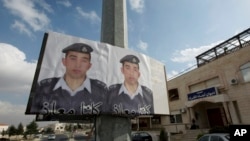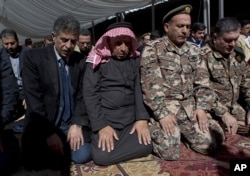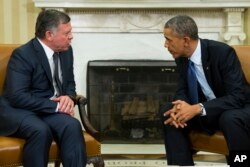The gruesome killing of captive Jordanian pilot Muath al-Kaseasbeh at the hands of Islamic State militants appears to be galvanizing Arab public opinion against the group.
Jordanians mourned Kaseasbeh's death in mosques across the country Wednesday, with widespread sorrow and indignation. Crowds chanted slogans against the Islamic State group, as public figures demanded revenge for the slain pilot.
Safi Kaseasbeh, the pilot's father, told journalists and others gathered to pay their condolences that Wednesday's execution of two Islamic militants, Sajida Rishawi and Ziad Karboli, was not sufficient to avenge the death of his son. He urged the Jordanian government to exact a heavy price on the "brutal and criminal" Islamic State group, which he said sullies the true nature of Islam.
His reaction was echoed in the words of Islamic and political leaders across the Arab world. Egypt's venerable Al Azhar University branded the militants "satanic" and “a source of filth and corruption on Earth.” Arab League chief Nabil ElArabi called the brutal killing a “heinous crime.” Political leaders in Iraq, the United Arab Emirates, Egypt and Lebanon also denounced the killing.
A barbaric act
The burning alive of the pilot evoked particular horror, and predictions from President Obama and others that it would further expose the barbarity of a group that has made mass executions, beheadings, crucifixions, mass rape and slavery their calling cards.
The brutality of Kaseasbeh's death brought many people to tears Wednesday and prompted normally stoic commentators to express grief. In Kaseasbeh's home town of Karak, a neighbor condemned the killing as "unacceptable in Islam."
King Abdullah, who met briefly with President Barack Obama at the White House Tuesday, arrived home in Amman Wednesday to face public calls for action. In a televised address to his people late Tuesday, he insisted that national tragedy has united everyone.
But among the calls for vengeance, some protesters questioned why Jordan was taking part in the U.S.-led coalition against IS. Kaseasbeh was captured after crashing in Syria while taking part in the coalition's efforts, adding to worries about the failure of the U.S. and others to secure the release of hostages the militants had publicly threatened to kill.
Justification
Supporters of IS went on social media to praise the killing, arguing the burning death was "justified."
American University of Beirut political scientist Hilal Khashan pointed out that in the video released Tuesday by the killers, they cited a verse in the Koran.
"They justified their action on the basis that the coalition's air attacks killed many innocent civilians and they displayed some gruesome images about the outcome of such air raids, including the burning of people alive," he said. "In Islam, in the Sourah Al Baqara, in Sourah number two, verse 194, it says 'if one transgresses against you, you may respond likewise'” he noted.
But as the condemnation of Kaseasbeh's killing continued to flow in Wednesday, it became clear that interpretation of religious text - one found in other Abrahamic faiths - has been widely rejected.



